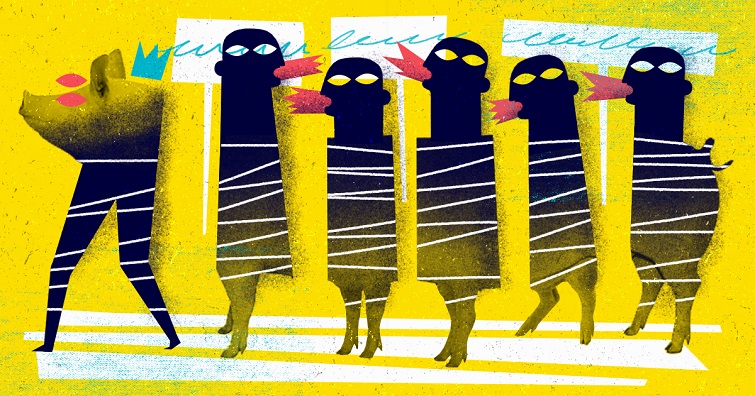
For the women of today, leaders.
Regina Coyula, Havana, 23 October 2020 (Originally published in El Estornudo).
In 1980, I worked for G2 (yes, the G2), and I provided staff support to that gigantic “Operation Inca” launched during the events at the Peruvian Embassy. The first times I crossed the many throngs, vociferous and intimidating, where Fifth Avenue splits and opens up to the old Abreu Fontán roundabout, I felt the real possibility of physical aggression. Only after reaching the post of the entrance was I able to breathe easily. At Abreu Fontán, there was a concentration of citizens who would abandon the country through the Port of Mariel.
I, who am not one to wear T-shirts and never have been, acquired three of those “Down with the Blockade,” “Yankees out of Guantanamo,” and “No Spy Flights” T-shirts, each one with a corresponding image. They were my fragile protection to feel safe among the crowds. I was not deterred by my great and disarming fear of the wall of “indignant people” seeking their freedom. In the weeks that I worked in that beach spa, converted into a noisy, crowded, and smelly warehouse of anxious people, ignorant of their future, sustained only by their hope of leaving, I thought of the fear of the “other”.
I rejected the barbarity of the acts of repudiation, that amorphous and anonymous mass, which unleashed its impunity and its instincts, which baited frustrations and in collusion with the authorities, passed them the bill. I did not participate in any repudiation. The only one on my block was against a single family, quiet and decent, who never pretended to be in favor of the government. It was carried out by four vociferous women who had just arrived in the neighborhood.
Carlitos Berenguer, himself, received the derision for all those who left. He was, as far as I know, a mid-level government official; however, in front of his building on 26th Avenue, very close to my house, they built a stage with audio and lighting equipment. Every day, they organized a program, which included everything from loud songs to the worst references about his personal life. This was accompanied by gas and power outages and graffiti on the front door of his apartment.
I cannot imagine the hell his family went through and was ashamed for them the one time my curiosity detained me there. I recognized in many of the faces the same rejection it inspired in me, but they did their part to appear neither too enthusiastic nor too apathetic. Spontaneously, those who were purely ideological took the microphone, they raised their fists and lost their voices during their diatribes.
To many of them, who today spit in disgust in the four corners of the world when anyone speaks of the Revolution, the fear of being unmasked accompanies them, and that also must be a very disturbing fear.
There were other cases less meaningful but which ended tragically in injury or death. I do not know if the data exist, 1980 was not the internet era, and much of that horror occurred unbeknownst to the world and even to Cubans themselves. I can understand hate eating away at them forever because, in life, there are strong blows. . . Even so, there were repercussions for the Government of Cuba. Retracting, after affirming that the people would take action; Fidel Castro declared the moral superiority of the people, putting an end, at least officially, to those shameful days of intransigence.
The latency of the method was maintained by the Rapid Response Brigades and during the “Maleconazo” of 1994, and especially so far during this century, against the peaceful opposition and especially against the Ladies in White.
It was my turn to closely observe the act of repudiation in 1993 against the families of my husband’s, Rafael Alcides’s, children. Hospitalized for months to protect my pregnancy, and three days after my C-section, the details of that grand performance and Alcides’s detention became known to me with time. The street closed off, cameras, loudspeakers, strangers taken from their workplaces to yell without knowing to whom or why they were yelling.
My own act of repudiation was missing. And I experienced it on December 10th and 11th of 2013 at the headquarters of Estado de Sats. Twenty years later, but the same methods: the street closed off, cameras, loudspeakers, strangers taken from their workplaces (and schools) to yell without knowing to whom or why they were yelling.
I do not want to focus on the repudiations, intrinsically vile. I want to focus on the fear. In the fear of blowing their cover and denouncing the degradation to which human beings were being subjected, those who on the previous day they greeted or perhaps they even owed a favor to the enemy. Of the fear that, like preventive medicine, they attempt to spread among an ever more indocile citizenry; of the participants’ fear of ending up transformed from the victimizers into the victims.
The fear of demonstrating my rejection at the “right moment and place,” the fear of being considered not sufficiently combative, the fear of not belonging. The fear at that the time they surrounded the headquarters of Estado de Sats and I decided to cook to set aside my worries that my family hadn’t heard from me since the day before. Terrible thoughts enter your mind at moments like those.
This is not a story, it is only to call attention to a phenomenon that is creatively recycled, always with those hateful ones whose help further damages — if that is possible — the fragile social fabric. That is the fear that remains.
Translated by: Silvia Suárez
